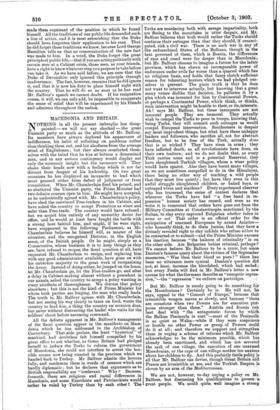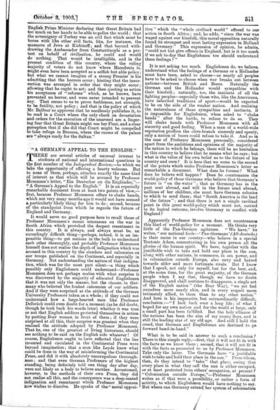MACEDONIA AND BRITAIN. N OTHING in all the present imbroglio has
disap- pointed — we will not say shocked — the great Unionist party so much as the attitude of Mr. Balfour. Its members have always deplored his appearance of indifference, his habit of reflecting on problems rather than thinking them out, and his aloofness from the average mind of Englishmen ; but they always comforted them- selves with the belief that he was at bottom a determined man, and. in any serious contingency would display not only the necessary insight but the necessary will. They shake their heads now with a feeling which is not far distant from despair of his leadership. On two great occasions he has displayed an incapacity to lead which must proceed either from defect of judgment or from irresolution. When Mr. Chamberlain fired his petard, and so shattered the Unionist party, the Prime Minister had two definite courses open to him. He might have accepted, as he undoubtedly agreed with, Mr. Chamberlain's policy, have shed the convinced Free-traders in his Cabinet, and have asked the country to accept Protection as wiser and safer than Free-trade. The country would have refused ; but we acquit him entirely of any unworthy desire for office, and he would at least have fought the battle with a strong host behind him, and might, if he were right, have reappeared in the following Parliament, as Mr. Chamberlain believes he himself will, as master of the situation, and the recognised Dictator, in the English sense, of the British people. Or he might, simply as a Conservative, whose business it is to keep things as they are, have refused to reopen the fiscal question at all, have requested Mr. Chamberlain to resign, and replacing him with any good administrator available, have gone on with his unbroken majority to the great work of reorganising the Army. Instead a doing either, he jumped on the fence, let Mr. Chamberlain go, let the Free-traders go, and after a delay in Cabinet-making almost without a precedent in our annals, asked the country to accept a policy wanting in every attribute of thoroughness. We discuss that policy elsewhere ; but this is not the kind of Prime Minister for whom both parties are longing, the man who really leads. The truth is, Mr. Balfour agrees with Mr. Chamberlain, but not seeing his way clearly to taxes on food, wants the country to lead him, a thing the country on occasion does, but never without distrusting the leader who waits for the soldiers' shout before assuming command.
All the defects apparent in Mr. Balfour's management of the fiscal question appear in the manifesto on Mace- donia which he has addressed to the Archbishop of Canterbury. That able prelate, the least " hysterical " of mankind, had doubtless felt himself compelled by his great office to ask whether, as Great Britain had pledged herself to ,induce the Turks to reform the government of Macedonia, she could not interfere to arrest the hor- rible scenes now being enacted in the province which we handed back to Turkey. Mr. Balfour admits the horrors fully, and condemns them in words of censure which are hardly diplomatic ; but he declares that arguments as to British responsibility are "irrelevant." Why Because, forsooth, there are religious and racial differences in Macedonia, and some Exarchists and. Patriarchists would rather be ruled by Turkey than by each other ! The Turks are murdering both with savage impartiality, both are fleeing to the mountains in utter despair, and Mr. Balfourbelieves that both would rather the Turks should continue their outrages than that they should, if emanci- pated, risk a civil war. There is no such war in any of the enfranchised States of the Balkans, though in the best governed of them, which is Bosnia, the differences of race and creed were far deeper than in Macedonia:; but Mr. Balfour chooses to imagine a future for the latter province, which has shown an incomparable power Of endurance under evils far worse than a quarrel which his no religious basis, and holds that fancy sketch sufficient reason for tolerating horrors which we had pledged our- selves to prevent. The plain truth is that he does not want to intervene actually, but knowing that a great many voters dislike that decision, he palliates it by.-a plea which was invented for him by Continental Powers, or perhaps a Continental Power, which think, or thinks, such intervention might be hostile to their, or its,interests. Ah ! says Mr. Balfour, but these insurgents are not innocent people. They are immoral. They actually wish to compel the Turks to pour in troops, knowing that, being Turks, they will commit such outrages as would compel European intervention. Southerners in despair say most imprudent things, but what have these unhappy leaders and followers, who sacrifice all, not for abstract freedom, but to be free of the Turk, actually done that is so wicked ? They have risen in arms ; they have inflicted death, as all revolutionists have done, on their own traitors ; and we do not doubt that, as every Turk carries arms and is a potential Reservist, they have slaughtered Turkish villagers, whom a wiser policy would have spared. Also they have burnt many villages, as we are sometimes compelled to do in the Himalayas, there being no other way of teaching a wild people that they must live quietly ; but have they even in this awful struggle slaughtered children, or baked boys, or outraged wives and maidens? Every experienced observer who has traversed the scene of contest declares that wherever the Turks have had "a free hand in re- pression" human society has ceased, and even as we write it is rumoured that orders have gone out from the Military Committee at Constantinople, sanctioned by the Sultan, to slay every captured Bulgarian whether taken in arms or not. That order is an official order for the extirpation of unarmed Europeans by armed Asiatics— who honestly think, to do them justice, that they have a divinely revealed right to slay infidels who refuse either to be converted or to submit—and the Prime Minister excuses his inaction because "the balance of criminality" is on the other side. Are Bulgarian babies criminal, perhaps ? We cannot believe Mr. Balfour to be a cynic, but since Danton's famous query about the victims of the September massacres, "Was then their blood so pure ? " there has been no utterance more cynical. Danton's question did not, at least, increase the bloodshed, which had ended; ; but every Pasha will find in Mr. Balfour's letter a new excuse for what the Germans describe as "energetic repres- sion,"—the " repression " we enforce on partridges.
But Mr. Balfour is' surely going to do something for the Macedonians ? Certainly. he is. He will not, h% says, appeal to the "Concert of Europe," because that irresistible weapon moves so slowly, and because "there are occasions when two Powers are for executive Pui.- poses stronger than three." Austria and Russia &it best deal with "the antagonistic forces by which the Balkan Peninsula is rent "—most of the Peninsiila is as quiet as Wales—while if they were suspicions or hostile no other Power or group of Powers could do it at all ; and therefore we support and strengthen them in urging a scheme of reforms which Mr. Balfour acknowledges to be the minimum possible, which has already been sanctioned, and which has not arrested. the sack of one village, the execution of one unarmed Macedonian, or the rape of one village mother too anxious about her children to fly. And this perfectly futile policy is all that Mr. Balfour can devise, though Great Britain and France are irresistible at sea, and the Turkish Empire is cloven by an arm of the Mediterranean.
We are not, however, to-day urging a policy on Mr. Balfour, but discussing his qualifications to govern it great people. We could quite well imagine a strong English Prime Minister declaring that Great Britain had tco much on her hands to be able to police the world ; that the sovereignty of Turkey was an evil fact which must be borne with like other evil facts, like, for instance, the massacre of Jews at Bishineff ; and that beyond with- drawing the Ambassador from Constantinople as a pro- test on behalf of civilisation, he could and would do nothing. That would be intelligible, and in the present condition of this country, where the ruling majority of voters do not know where Macedonia is, Might even have been accepted as a selfish but able policy; but what we cannot imagine of a strong Premier is his admitting that the horrors occur ; hinting that the insur- rection was arranged in order that they might occur ; allowing that he ought to act; and then quoting as action his acceptance of " reforms " which, as he knows, have prevented no horror, and were never intended to prevent any. That seems to us to prove feebleness, not strength, to be futility, not policy ; and that is the policy of which Mr. Balfour so approves that he needlessly publishes it, to be read in a Court where the only check on devastation and orders for the execution of the unarmed are a linger- ing fear that Great Britain might use her Fleet, and a clear perception that if she did that Court might be compelled to take refuge in Broussa„ where the rooms of the palace are "always ready for the Sultan."



























































 Previous page
Previous page